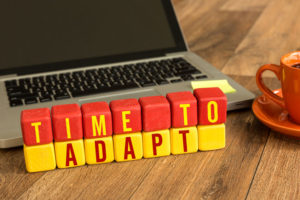By Rose O. Sherman, EdD, RN, FAAN
During a virtual workshop, a perioperative leader asked the insightful question – should we be interviewing for different skills in this environment? We have learned from polling during these workshops over the past two months that the majority of health systems either redeployed or furloughed their perioperative staff during the COVID-19 crisis. Although they hope to reopen all of their perioperative areas soon, the reality is that we could be looking at a second wave. Even without a second wave, there is still a question about consumer confidence in having elective surgeries before a vaccine is available.
We talked about the need at this point to hire new staff who are adaptable and don’t demand certainty about their assignments and work schedule during these challenging times. This would be a change in how new staff are assessed but is essential. We know that many nurses are struggling with adapting to the changes in their environment.
As we move into a different future, adaptability will be an essential competency. We all need to be more flexible during times of change. The Center for Creative Leadership defines adaptability as having ready access to a range of behaviors that enable us to shift and experiment as things change. We know from leadership research that a failure to adapt is a crucial reason for professional derailment. Adaptability, according to CCL, can be assessed by asking yourself the following questions:
- Can you accept the change as positive?
- Do you see change as an opportunity?
- Can you adapt your plans as necessary?
- Can you quickly master new technology, vocabulary, operating rules?
- Can you lead the change by example?
- Do you take into account other people’s concerns?
- Are you able to sort out your strengths and weaknesses fairly accurately?
- Do you admit personal mistakes, learn from them, and move on?
- Are you able to remain optimistic?
If you answered no to many of these questions, the good news is that you can still grow your adaptability muscle by doing the following:
- Stay curious during change – don’t default to the negative but instead ask questions and consider how you could grow from this experience. Be more like an anthropologist who asks why is this happening?
- Be less insistent – don’t get too attached to one plan, idea, or strategy but instead have strong opinions that are weakly held (so you can change your mind).
- Build systems to support you – don’t go it alone but rather have people who can both support and, if needed, challenge you. If they know you well, they can point out past areas of your life where you have been adaptable.
- Be honest about your reactions to change – if you know that you tend to be negative, then you can proactively intervene and push yourself to be a more proactive early adopter.
- Immerse yourself in the change – practice being adaptable but embracing a yes mindset where you find ways to become part of the solution.
The need for adaptability will not go away as the pace of change is expected to accelerate. Knowing what you can control is vital, and that is your behavior and your reaction. It will ultimately be a key to greater success.
Read Rose Sherman’s book – The Nurse Leader Coach: Become the Boss No One Wants to Leave
© emergingrnleader.com 2020



 LinkedIn
LinkedIn Instagram
Instagram